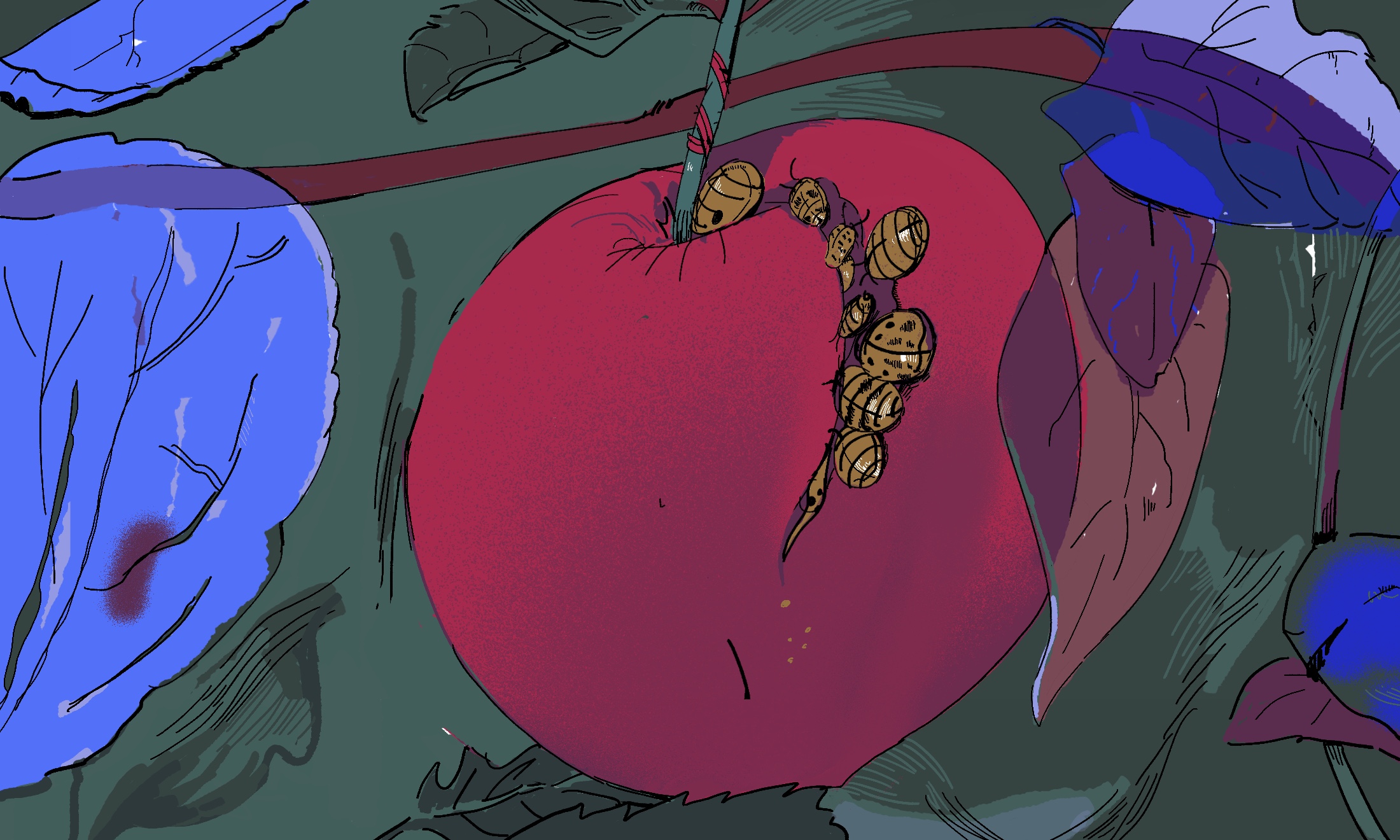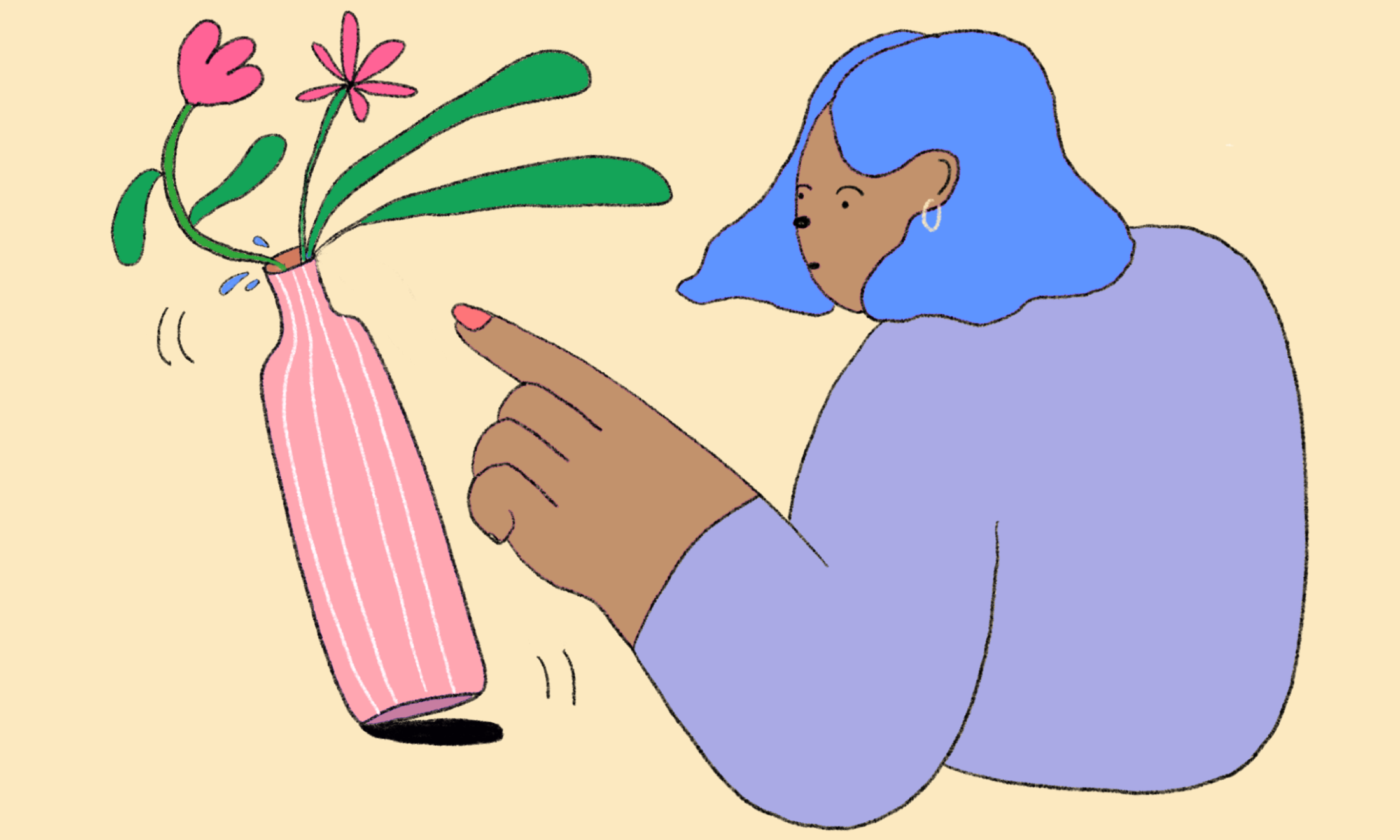I thought sex parties would free my sexuality. The reality was more dystopian than utopian
After I broke up with my ex, I wanted to be single, queer and carefree. But my experience at sex parties troubled me.
Khadija Osman
07 Dec 2022

Ning Yang
Content warning: This article contains mentions of sexual assault, drug abuse, homophobia and transphobia.
I first sought out sex parties as a bisexual woman coming out of a long-term relationship with a cis, straight, male, white partner. After being monogamous for five years, I wanted to connect with my sexuality and sensuality in a new way – one that could enliven my desires to be single, queer and carefree. Lockdown had just lifted, clubs were back again and listening to Beyoncé in my underwear with a bunch of equally repressed and excited strangers sounded ideal.
As someone who’s never been very spontaneous, I did my sex party research. I spent months listening to personal accounts and reading online reviews, articles and promotional material. I decided to first try a club night with a playroom.
“I spent months listening to personal accounts and reading online reviews, articles and promotional material”
Playrooms are often touted as a good first step for people who have been to clubs before and know the procedure. The difference between playroom nights and traditional club nights is that you follow a dress code (often lingerie and fetish gear), phone cameras are temporarily covered, staff patrol the event to provide assistance and one room is set up for sexual activity. With these precautions in place and my extensive research done, I felt ready for my first playroom.
But during my first visit, I was assaulted. Having taken a partner into the play space, another guest placed a vibrator with no barrier protection on my bare genitals without even mentioning the toy. With complete darkness around me, along with the inhuman sensation of vibrating silicone which was likely unhygienic, the shock was terrifying.
When I reached out for help after the incident of my assault, I was left feeling cold with the response. Replies took days to arrive and my experiences were questioned in that incredulous way many women will be familiar with. I was told that more workshops would be added to the club night’s non-mandatory social calendar and more social media posts would be posted to emphasise consent. After some back and forth, I was told that I should look forward to later communication on my issue, but was subsequently never emailed again.
After these experiences, I tried another playroom, but was told upon arrival that the room for sex would be shut that evening. When I pressed on why it wasn’t open, I was told that a guest had been impersonating staff and molesting guests. Until the club was able to handle the situation the room would not be open for play.
“During my online research I’d been assured that these playroom clubs were enjoyable, beginner-friendly and safe”
The danger of these heightened sexual spaces had occurred to me before I attended them. Walking around in what the dress code demanded could mean I had a high chance of being ogled, groped or heckled. But I had expected the armband-wearing staff to deter more overt, predatory behaviour. This many incidents of assault in my first few months attending sex parties worried me.
During my online research I’d been assured that these playroom clubs were enjoyable, beginner-friendly and safe. I’d researched spaces that prided themselves on being for people of colour and queer people – demographics that are often vulnerable to these kinds of attacks. I’d even attended mid-week bar meetups for all three of the events, hosted for guests to speak outside of an explicitly sexual space and make friends pre-party. My mind was racing. During the research I did before I visited these spaces, why hadn’t I read anything comparable to my eventual experiences of assault?
Perhaps no one thought they had to tell me. The party nights I had attended were franchised events, moving from venue to venue as their contracts allowed. And just like club nights aren’t responsible for publicly advertising the numbers of spikings on their property without a freedom of information request, sex parties aren’t under any obligation to advertise that information either.
But external data does show that assault numbers are rising year on year. In early 2022, the Metropolitan Police revealed that there were 207 reports of sexual assault in London between 1 January and 31 October in 2021, and a further 29 reports of rape in London nightlife venues. With the limited statistics available, there’s no way to be sure that these club nights with playrooms are any more dangerous than a regular club.
“Sex parties are just another microcosm of the lonely, confusing world we live in”
After my experiences at playroom club nights, I decided to attend “personal parties” instead, with the hope that a more selective space would steer off the average nightlife crowd. Not every personal party is as small and close knit as you might expect, but most guests are vetted to a certain degree. I thought that even a few people knowing the full name of all the attendees at a party like this would reduce the likelihood of assault. But what I experienced in this space was a deeply insidious danger, if more subtle.
Under the beautiful illusion of everyone trusting each other more in these semi-private spaces than public-facing clubs, guests were not held to account for their individual actions that made other party attendees uncomfortable. I witnessed frequent and borderline dangerous drug use at these events without intervention from the organisers, even at parties advertised as being safe from chemsex or that asked guests not to over-intoxicate. Often I saw people drugging themselves unconscious but, as long as no one was coerced to partake in drug use, it was allowed.
People were left to govern their own actions without intervention from organisers. This extended into how guests interacted with each other. Extremely toxic partner dynamics were overlooked and dismissed for any couples who were perceived as big in the scene. I also got used to bracing myself for homophobic comments. The most exasperating of which was when I was at a swingers party, and was the only queer woman present, and heard a guest say: “Well, all girls are pretty much gay, aren’t they?” At another party I had to leave a showroom after watching a trans woman being misgendered by multiple partners to her obvious discomfort.
“We can all agree that we are nowhere close to where we hope to be”
I’ve been attending sex parties for a while now. I’ve made some good friends and great memories. But the amount of bad sex party experiences I’ve had has impacted how I interact with the scene. I don’t think the reality of sex parties is adequately portrayed to ‘newbies’ entering the scene. Sex parties are just another microcosm of the lonely, confusing world we live in. Just like everyday life and traditional clubs, sex parties reflect the power dynamics of our societies – and often these disempower and hurt queer people of colour most.
The community I’ve found in the sex party space was discovered through connecting with others about our bad experiences as much as our amazing ones. Through my time here, I’ve been able to find people who also felt blindsided by the utopian advertising that talked about an “out-of-this-world, hauntingly beautiful” sexual experience. I’ve found people who are willing to work together to take up space and create a safer, more accepting future in this scene. We can all agree that we are nowhere close to where we hope to be. But we know that with every memory we’re creating together, every complaint we’re filing and every song we’re dancing unabashedly to with our queer, brown bodies, we’re doing something to make the space better and shape it in our own image.
Below is list of links to resources that may be helpful if the issues of sexual assault and violence raised in this article have impacted you:
Galop offers supports for LGBT+ survivors of sexual assault, hate crimes and domestic violence. Their services include a helpline and online chatbox, as well as advocates and caseworkers who can give advice and emotional support.
Victim Support is a charity that helps victims of crimes and traumatic incidents in England and Wales. They can provide counselling and legal advice amongst other types of support.
Rape Crisis Scotland is an organisation working to transform attitudes, improve responses and ultimately to end rape and sexual violence in all its forms.
The contribution of our members is crucial. Their support enables us to be proudly independent, challenge the whitewashed media landscape and most importantly, platform the work of marginalised communities. To continue this mission, we need to grow gal-dem to 6,000 members – and we can only do this with your support.
As a member you will enjoy exclusive access to our gal-dem Discord channel and Culture Club, live chats with our editors, skill shares, discounts, events, newsletters and more! Support our community and become a member today from as little as £4.99 a month.









